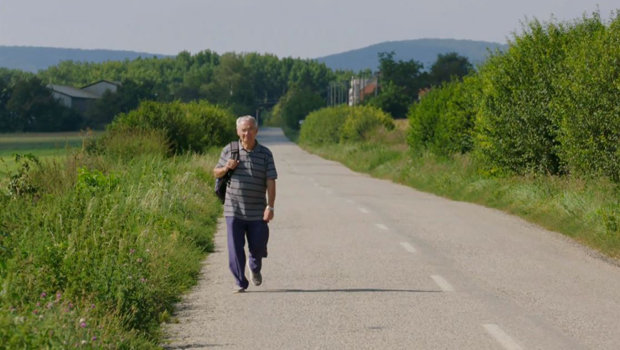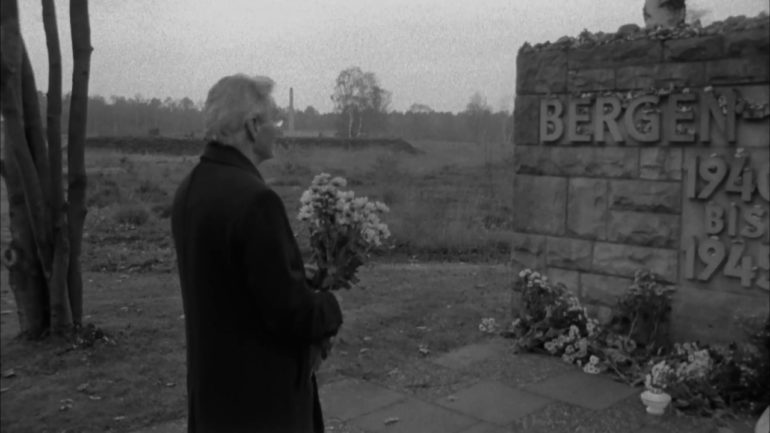Tomi Reichental’s second documentary Condemned To Remember, about his WWII experiences as one of the last Holocaust survivors, is currently on cinema release in Ireland. Directed by Irishman Gerry Gregg (who also directed the first documentary, Close To Evil) Condemned To Remember is a journey into the past, and an exploration of more modern day Europe, which in some places is seeing the return rise of anti-semitism. Initially Tomi began this documentary to follow up on his quest to talk to a former SS member, Hilde Lisiecwiz, who although having spent a year as a war criminal, later denied any guilt or responsibility for her crimes.
Scannain spoke to Tomi, who lost forty members of his family to the concentration camps, about his deportation to Bergen-Belsen in 1944 and what happened when he got to the home of Hilde Lisiecwiz in Germany.
Tomi (80) has lived in Dublin since 1959 and regularly gives talks to Irish school children about his ordeal.
Q. Tomi, what actually happened to your family when you were deported?
Well, the Holocaust started in 1939 and we didnt feel anything in Slovakia. Then they introduced these laws, all kinds of restrictions on things. We got a yellow star and we couldnt go to school. Children had to wear the star from the age of five. But we didnt wear it in the village, because there were no police there. So they kicked me out of the school because I was Jewish. That happened around 1941. I had to go to a village where there were several Jewish schools. I mean I couldnt go to National School. The adults knew what was going on, from newspapers. I was happy and playing, I didnt know what was coming around.
But the other kids, who were not Jewish, started to shout at us, They would spit and throw stones. Then I realised. What did I do? When I saw Gentile children, as a six or seven year old, I would run to the other side of the road.
After this, in 1942, the deportation started. A lot of single Jewish people got married to evade attention. My own uncle did and it turned out to be a very happy marriage. Anybody who was not useful to the economy were being taken. My father, as a farmer, was considered useful. At that time Slovakia was not occupied by the Germans, the Slovaks passed the Jews to the Germans.
The Slovaks paid 500 marks to the Germans for every Jew taken, which was unique. It didnt happen in any other European country.
By 1944, Germany did occupy Slovakia to keep a fascist government there and then everybody had to go. From the Jewish population of about 90,000 people, 25, 000 were only left. About 65, 000 had already been taken.
Have you any recollections of Bergen – Belsen?
Yeah, I have a lot of recollections. We were separated from my father when we were taken. He was in a cattle car and he jumped out of the train and joined the Resistance Army. And he survived. We were in Bratislava and somebody told on us, so we were caught. At that time, thirty members of our family were taken. Six of us went to Bergen – Belsen, my brother, my mother, my aunt, one of my cousins and my grandmother. My grandmother, unfortunately passed away in the concentration camp. I was nine year old. Only six members of my family survived, five from Bergen – Belsen and my cousin who was in Buchenwald. He was fifteen year old.
It was horrific what we went through in Bergen-Belsen, It’s very difficult to describe, the trauma we went through and what we saw.
And, you didnt speak about it for years?
I didnt speak about it for twenty five years. I lost my wife fourteen years ago and she didnt know anything. It’s now only the last several years that we are talking about it. My brother and cousin who are still alive too, we cant believe we got through it and survived it.
My doctor’s father was there at the liberation of Bergen – Belsen. I asked him if he had any photographs of it. He said, “Tomi, he never spoke about it.” It was such a trauma. It was only when my wife passed away I suddenly realised that I’m one of the last survivors who remembers it.

What happened about the German lady, Hilde Lisiecwiz, who was in the SS and whom you tried to talk to. She moved from her apartment. Did you find out where she went?
No. We went there when we were filming Condemned To Remember. After the story came about her being on the Walk of Death with Jews going to be killed, it went around the world, to Canada, Europe, China, England. I got a newspaper from China with a story about it…I couldnt read it, but I still have the cutting of it.
Anyway, journalists were knocking on her door and it became so bad she left. She is 95 years old. We have a feeling she went to live with her daughter, just because she wanted to avoid it all.
You thought she should admit responsibility?
At the end of the war she was put on trial. There were witnesses that she killed two people, a Russian and a Greek.
She got a year for that, which she did. But you cant put someone on trial for the same crime twice.
I had no intention of putting her on trial whatsoever. I told her I didnt want to talk about the past. I made that clear to her. I want to talk about the future, as remnants of the war. Victim and persecutor, in some sort of reconciliation.
She had given a lot of interviews – there are three or four DVDs which have them. At no time ever did she show any regret or remorse. Or apologise. Most of what she said was all lies.
So, in the film you go back to the garden in Slovakia you played in as a small child?
Well, the director Gerry Gregg let the film run without any rehearsal. I really spoke with feeling and it was very strong. I only remember the place where I spent beautiful days. I was there only three weeks ago. I got to the village and I had the overwhelming feeling I had come home, you know, even though it’s no longer home. I shared this feeling with my brother and he said it was the same thing with him.
You came there, there is nothing…but there is some vibration. When you look around you can see the contours of the mountains. You remember, nothing changed.
Thanks to Tomi for giving generously of his time.

